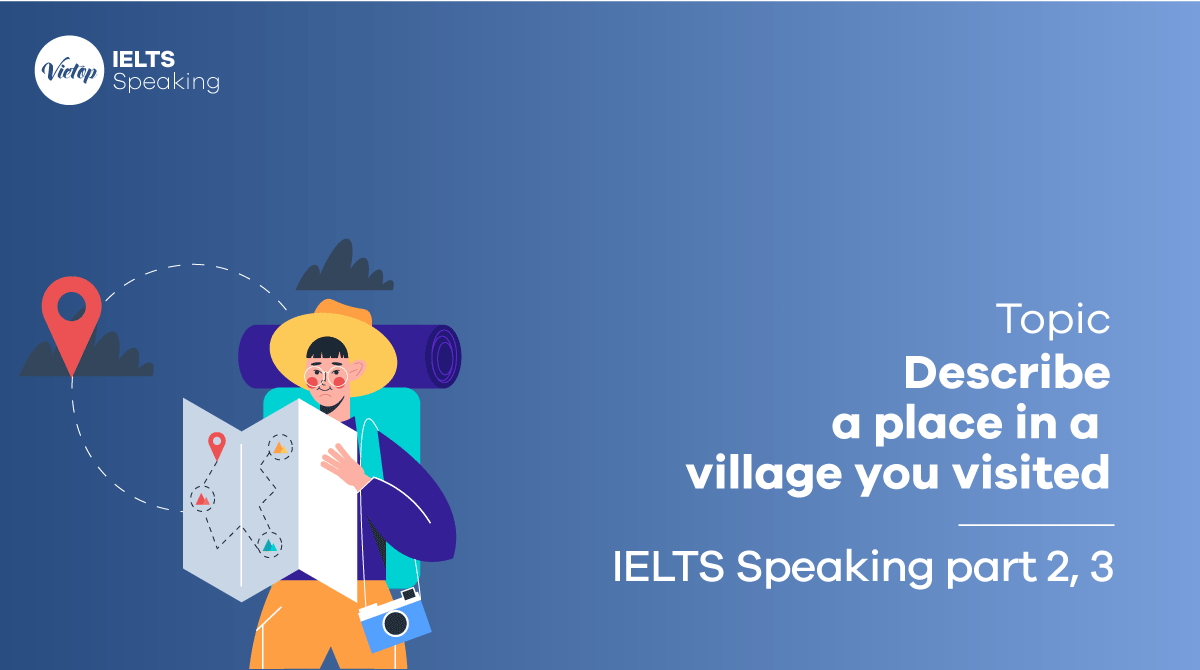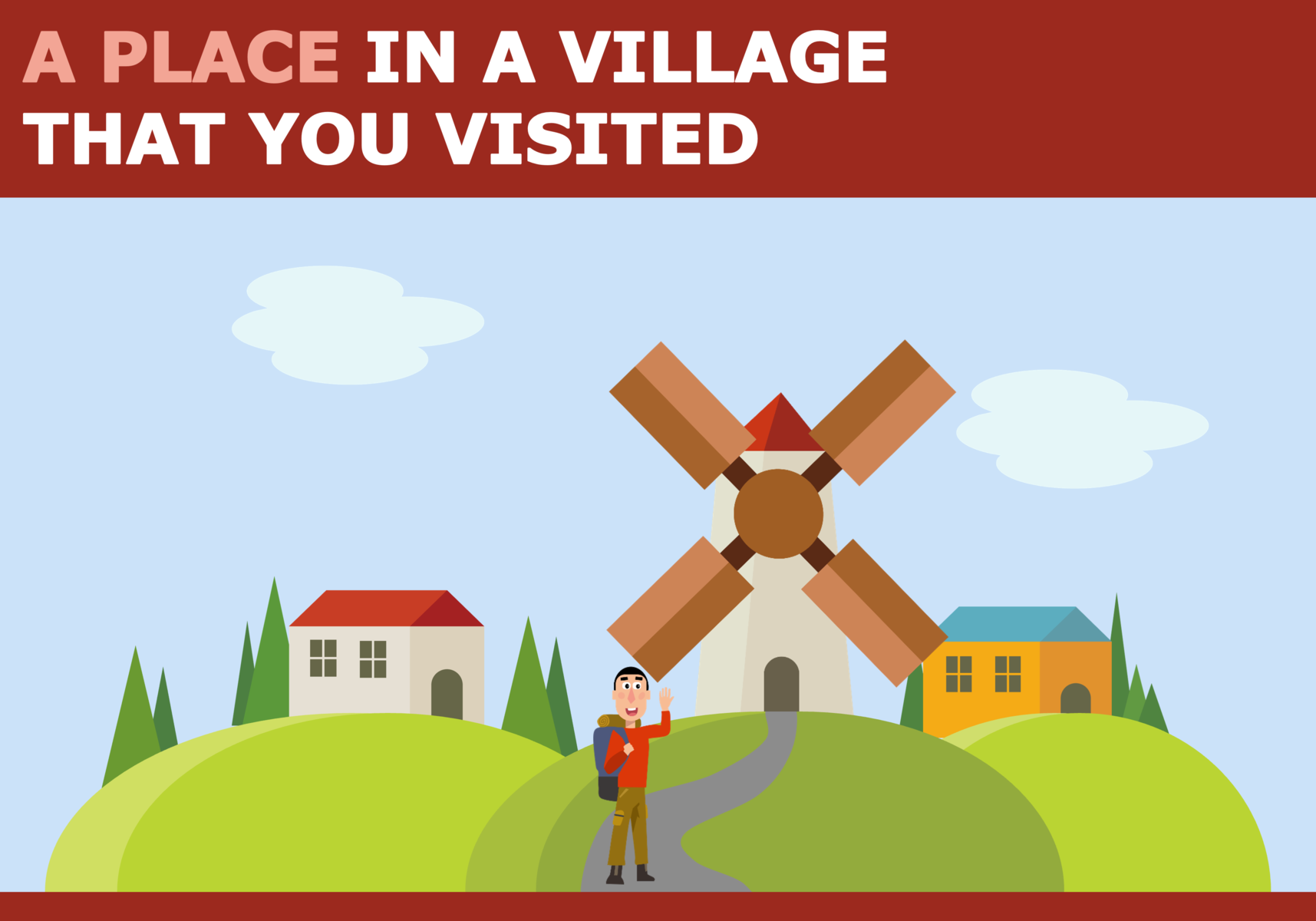Describe A Place In A Village You Visited là một chủ đề từng xuất hiện trong bài thi IELTS Speaking Part 2. Tiếp nối với chuyên mục IELTS Speaking, hôm nay Vietop sẽ cung cấp cho bạn các bài mẫu trong IELTS Speaking Part 2, Part 3: Describe A Place In A Village You Visited với bộ từ vựng cực hay và chi tiết nhé!
IELTS Speaking Part 2 Sample: Describe A Place In A Village You Visited

Đề bài
Describe a place in a village that you visited
You should say:
- Where it is
- When you visited the place
- What you did there
- And how you feel about the place
IELTS Speaking Part 2 Sample
I don’t have many trip memories since, if at all possible, I want to stay at home. On the few times that I do go on travels, though, one place truly jumps out. It is a neighborhood market in the tiny town of Sapa, which is located in the hilly region of northern Vietnam. I went to Sapa two or three years ago, I think, to witness the snow, which, as you may know, is scarce in our tropical nation. We visited a local outdoor market where residents often purchase a variety of things while we were there. I found it to be really interesting and novel.
I’d like to start by saying that the market was noticeably different from what I was accustomed to seeing in the city. Numerous residents were seen wandering the streets dressed in their vibrant, traditional costumes, which lifted the mood. There were several goods all around you, ranging from unique apparel items to unique fresh foods. But what really drew me in was the store’s assortment of antique jewelry and handicrafts. I browsed a few stalls before deciding to purchase a scarf with distinct tribal motifs and other inexpensive local mementos for my family.
In general, I was happy to attend the market since it gave me an opportunity to engage with Sapa’s incredibly friendly residents and see a true native setting. I was born and bred in a city, so going to the market was really eye-opening. In addition, I could contribute to the local economies by purchasing presents and souvenirs. If possible, I would really like to come back here.
Vocabulary Highlights
- Jump out (v): nổi bật
- Hilly region (n): vùng đồi nối
- Scarce (adj): khan hiếm
- Tropical nation: nước nhiệt đới
- Be accustomed to V-ing: đã quen làm gì đó
- Wander (v): lang thang
- Vibrant (adj): sôi động
- Lift the mood: thúc đẩy tâm trạng
- Unique apparel items: mặt hàng may mặc độc đáo
- Assortment (n): phân loại
- Antique jewelry and handicrafts: đồ trang sức cổ và hàng thủ công mỹ nghệ
- Browse a few stalls: lướt qua một vài gian hàng
- Distinct tribal motifs: họa tiết bộ lạc khác biệt
- Local mementos: vật lưu niệm địa phương
- Be bred: được nuôi dưỡng
- Eye-opening (adj): mở mang tầm mắt
Xem thêm:
- Describe a puzzle you have played
- IELTS Listening numbers and letters practice
- IELTS Vocabulary topic Veterinary science và Ornithology
IELTS Speaking Part 3 Sample: Describe A Place In A Village You Visited

Is there anything special about the villages in Vietnam?
Although villages in Vietnam are typically thought of as locations that provide a sense of peace or tranquility, nothing more, I would argue that villages in Vietnam preserve irreplaceable values of the Vietnamese people, from historical events to distinctive traditions that represent heroic periods in the past.
- Tranquility (n): sự yên bình
- Irreplaceable values: giá trị không thể thay đổi
- Historical events: sự kiện lịch sử
- Represent (v): đại diện
- Heroic periods: thời kỳ anh hùng
Why do people want to go to the countryside?
These days, a lot of individuals experience a lot of stress from their jobs or families. They can briefly escape their tension and get some relaxation by traveling to the country. Another factor is the comparatively bad levels of noise and air pollution in urban areas. In the country, people desire to breathe clean air and be near to nature. One approach to meeting new people is to go on a picnic or have a BBQ.
- Escape sb’s tension: thoát khỏi sự căng thẳng
- Get some relaxation: thư giãn
- Comparatively (adv): tương đối
- Urban areas: khu vực thành thị
What do people usually do when going to a village?
In a village, there are a lot of different things that people may do. Interesting events are planned in certain villages to draw tourists. For instance, people may go fishing in the river, work on the farm with the locals, feed the animals, create snacks, or do crafts. Most importantly, they may have a BBQ with their friends or eat clean, fresh cuisine in the village. Additionally, visitors may take in the beauty of nature, breathe in the clean air, and savor the tranquility of the moment.
- Feed the animals: cho động vật ăn
- Do crafts: làm đồ thủ công
- Fresh cuisine: ẩm thực tươi
- Savor (v): thưởng thức, hưởng thụ
Xem thêm:
Do you think people will live in the village in the future?
Since individuals often need to take into account a number of important elements before settling down in an area, such as facilities, traffic conditions, or work prospects, this would rely on the status of communities in the future. People will likely opt to live in villages if they become more developed in the future because of the atmosphere and health advantages they offer. Of course, major cities continue to have their advantages, but emerging villages are something to think about.
- Take into account (v): tính đến
- Settle down (v): định cư
- Facilities (n): cơ sở vật chất
- Traffic conditions (n): điều kiện giao thông
- Work prospects (n): triển vọng công việc
- The status of communities (n): tình trạng cộng đồng
- Opt to V: chọn làm gì
What can be done to improve life in rural areas?
The community and rural residents may effectively participate in improving rural livelihood. They support the management of their economic, social, and environmental goals by empowering rural residents and promoting the participation of women and young people in society.
- Rural residents: cư dân sống ở nông thôn
Does the government pay more attention to rural areas or urban areas?
Rural regions should receive more attention from the government since they are an integral component of our nation. Most politicians give metropolitan regions their whole focus while ignoring the development of rural communities. For the entire nation, rural areas are a tremendous source of food. For greater job opportunities, development should be pursued.
- Integral component: thành phần không thể thiếu
- Politicians (n): các chính trị gia
- Metropolitan regions (n): vùng đô thị
Xem ngay: Khóa học IELTS 1 kèm 1 – Chỉ 1 thầy và 1 trò chắc chắn đạt điểm đầu ra
What’s the difference between living in the countryside and living in the city?
The inhabitants of the city and the countryside differ greatly from one another. Due to superior educational facilities, city dwellers have higher levels of education than rural residents. On the other hand, rural residents are friendlier and more accommodating. Because of their hurried lifestyles, city dwellers have lost their sense of community and have turned inward. In villages, people live more slowly, get to know their neighbors, and still say hello to one another. People in cities have developed workaholism, thus visiting someone’s home without an appointment is now inexcusable.
- Superior educational facilities: cơ sở giáo dục vượt trội
- City dwellers (n): cư dân thành phố
- Accommodating (adj): dễ thích nghi
- Inward (adj): hướng nội
- Workaholism (n): tình trạng tham công tiếc việc
- Inexcusable (adj): không thể bào chữa
Hy vọng rằng qua bài viết này, bạn đã có thêm vốn từ vựng cũng như cấu trúc sử dụng cho dạng đề bài Describe a place in a village you visited. Bên cạnh về chủ đề IELTS Speaking Part 2, Part 3 Sample: Describe a place in a village you visited, bạn cũng có thể tham khảo thêm một số chủ đề khác thường hay gặp trong IELTS Speaking Part 2, Part 3. Chúc bạn chinh phục IELTS thành công!
source https://www.ieltsvietop.vn/blog/describe-a-place-in-a-village-you-visited/
Nhận xét
Đăng nhận xét